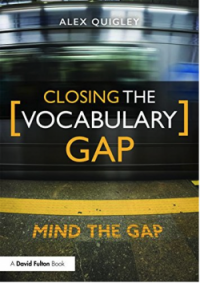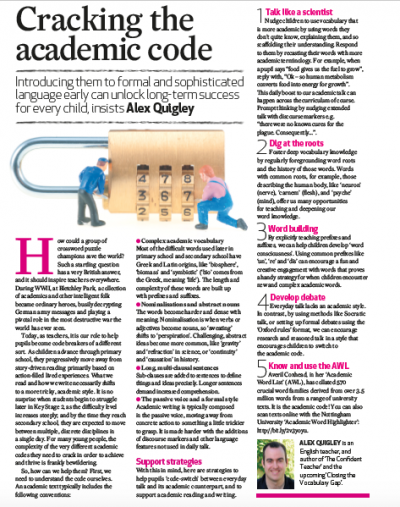(This article was first published in Teach Secondary Magazine. You can subscribe HERE)
How could a group of crossword puzzle champions save the world? Such a startling question has a very British answer, and it should inspire teachers everywhere. During WWII, at Bletchley Park, a collection of academics and other intelligent folk became ordinary heroes, busily decrypting German army messages and playing a pivotal role in the most destructive war the world has ever seen.
Today, as teachers, it is our role to help pupils become code breakers of a different sort. As children advance through primary school, they progressively move away from story-driven reading primarily based on action-filled lived experiences. What we read and how we write necessarily shifts to a more tricky, academic style. It is no surprise when students begin to struggle later in Key Stage 2, as the difficulty level increases steeply; and by the time they reach secondary school, they are expected to move between multiple, discrete disciplines in a single day. For many young people, the complexity of the very different academic codes they need to crack in order to achieve and thrive is frankly bewildering.
So, how can we help them? First, we need to understand the code ourselves. An academic text typically includes the following conventions:
- Complex academic vocabulary. Most of the difficult words used later in primary school and secondary school have Greek and Latin origins, like ‘biosphere’, ‘biomass’ and ‘symbiotic’ (‘bio’ comes from the Greek, meaning ‘life’). The length and complexity of these words are built up with prefixes and suffixes.
- Nominalisations and abstract nouns. The words become harder and dense with meaning. Nominalisation is when verbs or adjectives become nouns, so ‘sweating’ shifts to ‘perspiration’. Challenging, abstract ideas become more common, like ‘gravity’ and ‘refraction’ in science, or ‘continuity’ and ‘causation’ in history.
- Long, multi-clausal sentences. Sub-clauses are added to sentences to define things and ideas precisely. Longer sentences demand increased comprehension.
- The passive voice and a formal style. Academic writing is typically composed in the passive voice, moving away from concrete action to something a little trickier to grasp. It is made harder with the additions of discourse markers and other language features not used in daily talk.
Support Strategies
With this in mind, here are strategies to help pupils ‘code-switch’ between everyday talk and its academic counterpart, and to support academic reading and writing.
1. Talk like a scientist. Nudge children to use vocabulary that is more academic by using words they don’t quite know, explaining them, and so scaffolding their understanding. Respond to them by recasting their words with more academic terminology. For example, when a pupil says “food gives us the fuel to grow”, reply with, “Ok – so human metabolism converts food into energy for growth”. This daily boost to our academic talk can happen across the curriculum of course. Prompt thinking by nudging extended talk with discourse markers e.g. “there were no known cures for the plague. Consequently…”.
2. Dig at the roots. Foster deep vocabulary knowledge by regularly foregrounding word roots and the history of those words. Words with common roots, for example, those describing the human body, like ‘neuron’ (nerve), ‘carnem’ (flesh), and ‘psyche’ (mind), offer us many opportunities for teaching and deepening our word knowledge.
3 Word building. By explicitly teaching prefixes and suffixes, we can help children develop ‘word consciousness’. Using common prefixes like ‘un’, ‘re’ and ‘dis’ can encourage a fun and creative engagement with words that proves a handy strategy for when children encounter new and complex academic words.
4 Develop debate. Everyday talk lacks an academic style. In contrast, by using methods like Socratic talk, or setting up formal debates using the ‘Oxford rules’ format, we can encourage research and reasoned talk in a style that encourages children to switch to the academic code.
5 Know and use the AWL. Averil Coxhead, in her ‘Academic Word List’ (AWL), has collated 570 crucial word families derived from over 3.5 million words from a range of university texts. It is the academic code! You can also scan texts online with the Nottingham University ‘Academic Word Highlighter’.
You can find out many more strategies to crack the academic code in my latest book, ‘Closing the Vocabulary Gap‘ – available on Amazon HERE and on the Routledge website HERE.


I do enjoy your blog posts. This one is very close to my heart. The working title of my Masters thesis that I am working on currently is “ Cracking the code of disciplinary literacy”. (Lynne Gardiner NZ teacher)
That’s great. I have written a chapter about ‘disciplinary literacy’ in my upcoming book!
Hi Alex – is your book aimed at secondary level vocabulary or do you consider starting points on- entry to the school system? Particularly interested in disadvantaged/deprived areas. Regards, Alyson
Hi Alyson,
The opening chapter addresses the overarching issue, with the gap proving an issue before children even get to school. I then run the entire span of schooling. The book is aimed at both primary and secondary school teachers. Chapters about reading and spelling are highly relevant to primary school teachers, of course. Some parts of the book, such as the chapter on ‘disciplinary literacy’, i.e. subject specific literacy, is very much seen as a secondary school matter, but it is relevant to key stage two also. The practical strategies and next steps are also spanning all phases. Some of the strategies may be more KS2, KS3 and KS4 orientated.
Hi Alex,
As a Masters in Bilingualism student who is currently researching expressive vocabulary instruction as a pedagogical tool, I’d kindly request that you bring your publishing date forwards a few days to give me a bit of time to read and digest your book before my deadline date! 😉
On a more serious note, I am really interested to find out what theoretical perspectives/paradigms your methodology is influenced by?
Rach
Another excellent tool is rewordify.com. A huge time saver when it comes to preparing tier vocabulary lists and identifying the challenges in any text. Brilliantly, many classics are preloaded.
Thanks for the tip – I’m doing a blog on vocabulary websites too!